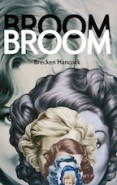
Book Review: Broom Broom by Brecken Hancock
Broom Broom
Poems by Brecken Hancock
Coach House Books, April 2014
ISBN-13: 978-1552452882
$17.95; 69pp.
Reviewed by Michael Luke Benedetto
Brecken Hancock’s debut book of poetry Broom Broom is brimming with poems of varying formal construction, haunting images, musical language, and endless bathtubs. Hancock often calls upon the gods of classical Greek myth—from Uranus and Gaia in the opening “Prologue” to Hephaestus in the ten-page chronology titled “The Art of Plumbing”—but what’s most engaging about this collection is the personal mythology that is constructed throughout and then brought into stark focus in the final pages.
Lovers of formal poetry will have much to study and savor here. Just as quickly as the mood shifts from moments of violence to a long cold bath, Hancock jumps from tightly-packed couplets and tercets to haiku to villanelle and back again. Flipping through these pages, the enticing asymmetry becomes apparent, save for in the midst of the few longer poems in the latter half of the book. A collection of haikus is scattered throughout, and these tragic lullabies absorb the time and attention of a much longer poem, as the grim details settle into the slowly accumulating family history that lingers between the lines. “Progression Blunts Empathy” is a perfect example:
…..Hush now, Mama, don’t
…..say a word. Daughter’s gonna
…..drink until you’re cured.
Though the broom and the witch that rides it expectantly appear in several places, Hancock’s real obsession is with water, bathing, and cleanliness—or lack thereof. The opening poem features Uranus, Greek god of the sky, as he “wades in low-lying plains, spas in every rain-filled meteor crater,” and shortly after Gaia (Mother Earth) enters the poem—amid “patches of pubic forest” and her valleys as “aqueducts feeding antechambers of lakes”—their progeny, “Oceanus—Titan of the brutish Atlantic,” bursts into being. The remainder of this poem is awash with “legions of mollusk princes,” “octopus tapas,” and “half-spumed clams,” but Hancock sets the tone for this collection early by placing the lyric “I” at the center of it all: “Gathering my hair off the pillow, I rise from the spill on our sheets to bathe.”
The language in Broom Broom transitions between lilting accounts of sex and violence and matter-of-fact, dryly-clever reportage—the latter almost exclusively in longer poems about plumbing. Yet through these disparate styles, Hancock’s voice remains strong, and a tragedy worthy of the book’s many mythical allusions grows to a boil that overflows in the penultimate poem “Once More,” which begins, “Between 1995 and 2013, my mom kept dying and dying and dying. It seemed she’d never finish.” After all that is laid bare in the final pages, the second read of this excellently-crafted collection is even more rewarding than the first.
Michael Luke Benedetto is a writer and editor who lives in San Diego, CA. His work has appeared in the Long River Review and The Essay Connection.

